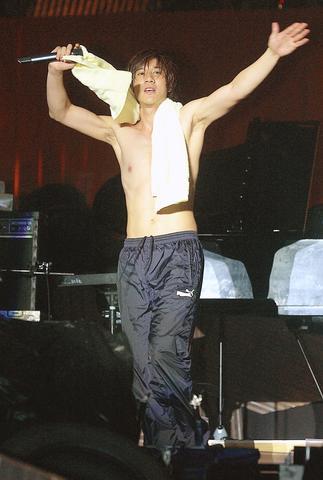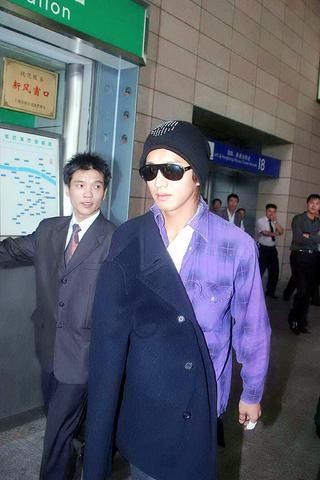Is there a community standard dictating how low pants can ride before they become indecent? Next Magazine (
Speaking of plumbers and not wearing underwear, A-hsian (
The path from smut to stardom is a well-worn one in Taiwan, having been taken by such stars as Shu Qi (舒淇) and Vivian Hsu (徐若瑄), the latter of whom said Saturday on the SET TV show Cover Person (封面人物) that she had no regrets about shooting a nude photo book 10 years ago. She also said on the show that her only true love has been the Japanese rock star Sugizo. Of her previous liaisons with the Japanese singer Gackt and Jay Chou (周杰倫), she said they were all just friends.

TAIPEI TIMES FILE PHOTO
Gackt and Vivian had a chance to see each other again last Saturday at Lee Hom Wang's (王力宏) concert, which went off without a hitch and was attended by about 20,000 screaming teenage girls and a few dozen boys, give or take a few. After eight years in the public view as a singer and heart-throb, this was Lee Hom's first headlining concert, so he came out strong playing guitar, piano, drums and rapping to prove his mettle as more than just another pretty face.
The other big show last weekend was the one in front of the Presidential Office for Double Ten Day. Shunza (順子), as a Golden Melody Award winner, was one of the most anticipated acts, but once onstage she made an ass of herself by singing off key and forgetting even the words to her own hit song Come Home (回家). The Apple Daily (
Fans of Wang Kar-wai (王家衛) will have to keep waiting for his next movie to finally come out. The film, titled 2046, was set to continue shooting last week in Shanghai, but for reasons unannounced, was postponed. Tetsuya Kimura (木村拓哉), the Japanese actor starring in the movie, had come all the way from Japan for the shoot, but ended up going home the next day with agents saying it was because he was sick. The suspicion, though, is that Tetsuya left in disgust when the filming was delayed at the last minute.

TAIPEI TIMES FILE PHOTO

As Taiwan’s second most populous city, Taichung looms large in the electoral map. Taiwanese political commentators describe it — along with neighboring Changhua County — as Taiwan’s “swing states” (搖擺州), which is a curious direct borrowing from American election terminology. In the early post-Martial Law era, Taichung was referred to as a “desert of democracy” because while the Democratic Progressive Party (DPP) was winning elections in the north and south, Taichung remained staunchly loyal to the Chinese Nationalist Party (KMT). That changed over time, but in both Changhua and Taichung, the DPP still suffers from a “one-term curse,” with the

William Liu (劉家君) moved to Kaohsiung from Nantou to live with his boyfriend Reg Hong (洪嘉佑). “In Nantou, people do not support gay rights at all and never even talk about it. Living here made me optimistic and made me realize how much I can express myself,” Liu tells the Taipei Times. Hong and his friend Cony Hsieh (謝昀希) are both active in several LGBT groups and organizations in Kaohsiung. They were among the people behind the city’s 16th Pride event in November last year, which gathered over 35,000 people. Along with others, they clearly see Kaohsiung as the nexus of LGBT rights.

Jan. 26 to Feb. 1 Nearly 90 years after it was last recorded, the Basay language was taught in a classroom for the first time in September last year. Over the following three months, students learned its sounds along with the customs and folktales of the Ketagalan people, who once spoke it across northern Taiwan. Although each Ketagalan settlement had its own language, Basay functioned as a common trade language. By the late 19th century, it had largely fallen out of daily use as speakers shifted to Hoklo (commonly known as Taiwanese), surviving only in fragments remembered by the elderly. In

Dissident artist Ai Weiwei’s (艾未未) famous return to the People’s Republic of China (PRC) has been overshadowed by the astonishing news of the latest arrests of senior military figures for “corruption,” but it is an interesting piece of news in its own right, though more for what Ai does not understand than for what he does. Ai simply lacks the reflective understanding that the loneliness and isolation he imagines are “European” are simply the joys of life as an expat. That goes both ways: “I love Taiwan!” say many still wet-behind-the-ears expats here, not realizing what they love is being an